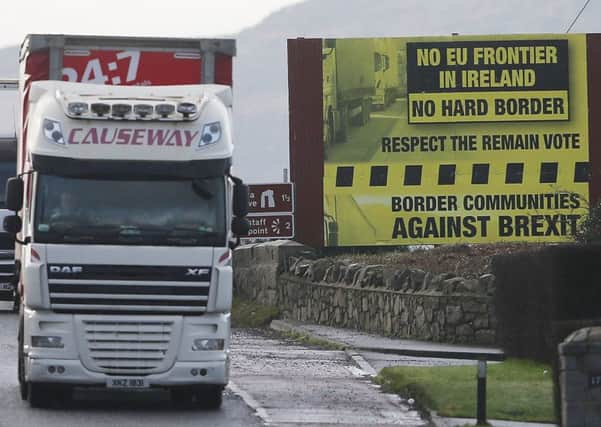Who really won the phase one talks? That depends on who you are asking


According to the agreement, the British Government is “committed to... avoiding a hard border” and “will maintain full alignment with those [EU] rules which... support North-South co-operation, the all-island economy and the protection of the 1998 [Good Friday] Agreement”. And there will be “no new regulatory barriers” between Northern Ireland and Great Britain.
My reading of that – shared by many other commentators – is that the UK government will adopt similar rules to those of the EU’s Single Market and Customs Union, even after it leaves the EU. That would enable Northern Ireland to trade with the Irish Republic and GB – and enable the Irish Republic to trade with NI and GB.
Advertisement
Hide AdAdvertisement
Hide AdBut there is one big problem with this analysis. If my interpretation is correct, why are some of the most ardent eurosceptics – such as former Conservative Party leader Iain Duncan Smith – happy with it? Clearly, they understand the agreement to mean something quite different. For one thing being “committed to... avoiding a hard border” is not the same thing as saying there will not be a hard border.
For another, it is possible to argue that the “full alignment” applies only to the activities referred to specifically in the Good Friday Agreement – energy, agriculture, health, transport, tourism, education, the environment, inland waterways, inland fisheries, marine matters, social security and urban and rural development. In which case, there is scope for significant regulatory divergence between the UK and the EU on other matters.
So which interpretation is correct? Time, perhaps, will tell. What we do know is that this lack of clarity was sufficient to enable the Brexit negotiations to move from phase one to phase two.
The other issues that had to be resolved for this progress were the size of the UK’s divorce bill – around £40bn to pay for commitments the UK had previously entered into – and a promise on the treatment of EU nationals living in the UK. (This does not include Irish nationals – including those born in Northern Ireland and who chose to have Irish nationality – who are assumed to be protected without the need of the Brexit agreement.)
Advertisement
Hide AdAdvertisement
Hide AdFor the Irish Government, the significance of phase one of the negotiations included its potential use of the veto if it was not happy with the outcome.
A decision on the negotiations in phase two on trade will be made by EU nations using qualified majority voting – so Ireland has now formally lost its veto.
But with the border and Ireland to be a continuing “distinct strand” in the phase two negotiations, it is possible that the Irish Government will in effect keep its right to block a trade deal that leads to some type of hard border.
We now move to phase two. Achieving a negotiated agreement on the trading relationship between the UK and the EU – including Ireland – may well be more difficult than the phase one process.
Advertisement
Hide AdAdvertisement
Hide AdAfter all, a more limited trade agreement between the EU and Canada took seven years to negotiate. That between the EU and Japan – also just finalised – took four years.
It would have been hoped that the most important outcome of phase one of the negotiations between the UK and the EU would have been the creation of a basis of trust, including between the key negotiators, Michel Barnier for the EU and David Davis, the UK’s Brexit secretary.
However, that trust has been blown by subsequent comments by Davis, who initially said in a television interview last weekend that the phase one agreement was not legally binding on the UK and then backtracked on this. The result was angry and now distrustful EU politicians.
This is absolutely not what the UK needs if it is going to get a satisfactory trade deal with the EU.
Advertisement
Hide AdAdvertisement
Hide AdFinancial journalist Paul Gosling is writing for the Derry Journal in conjunction with the Holywell Trust Partnership. The Holywell Podcast is available through SoundCloud and iTunes by searching for Holywell Trust and through your preferred podcast app.